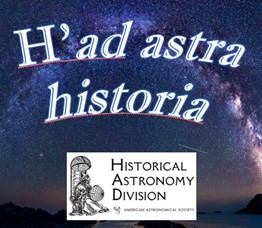Podcaster: Loretta Cannon for the AAS-HAD ; Guest: Dr. Luna Zagorac

Title: H’ad astra historia Episode 102 – Egyptian Star Clocks
Organization: Historical Astronomy Division, American Astronomical Society
Link: https://had.aas.org/
Description:
Today’s guest: Dr. Luna Zagorac describes her research into Egyptian Star Clocks – the ‘star charts’ found written on the ceilings of pharaoh’s tombs approximately 3000 years ago.
H’ad astra historia is the official podcast for the Historical Astronomy Division of the American Astronomical Society. We’re here to share stories from and about the people who study the stars, planets, and the cosmos. We’ll be hearing from individuals who not only study the history of astronomy, but also those who lived it, who were “in the room” during pivotal events within the last 50 years or so.
podcast music: “Frost Waltz” Kevin MacLeod (incompetech.com), licensed under creative commons: by attribution 4.0 license (http://creativecommons.org/licenses/by/4.0/)
Bio: Loretta Cannon, an AAS affiliate via Rose City Astronomers, is a member of the leadership committee for the Historical Astronomy Division (2023-2025). She is a polymath with degrees in anthropology, microbiology, and biochemistry, and has many years of experience in both the private sector and government. When not reading some of her way-too-many books, she watches BritBox, creates recipes, or plays in the garden. She chose science writing/editing in astronomy as a new career. In short, she’s a sciencephile-word-nerd-foodie-with-a-plant-habit who really likes the stars.
Today’s sponsor: Big thanks to our Patreon supporters this month: Paul M. Sutter, Chris Nealen, Frank Frankovic, Frank Tippin, Jako Danar, Michael Freedman, Nik Whitehead, Rani Bush, Ron Diehl, Steven Emert, Brett Duane, Don Swartwout, Vladimir Bogdanov, Steven Kluth, Steve Nerlich, Phyllis Foster, Michael W, James K Wood, Katrina Ince, Cherry Wood.
Please consider sponsoring a day or two. Just click on the “Donate” button on the lower left side of this webpage, or contact us at signup@365daysofastronomy.org.
Please visit our Patreon page: https://www.patreon.com/365DaysOfAstronomy
or you can consider to sponsor a day of our podcast : https://cosmoquest.org/x/365daysofastronomy/product/sponsor-an-episode-of-365-days-of-astronomy/
Transcript:
Rather than provide a complete transcript, we’re sharing links for further reading for the topics or names you’ve heard in today’s episode: “Egyptian Star Clocks”
Dr. J. Luna Zagorac: https://perimeterinstitute.ca/people/luna-zagorac
Astrogen – The Astronomy Genealogy Project: https://astrogen.aas.org/front/index.php
Ultralight Dark Matter – Yale Univ Dept of Physics article on Zagorac’s successful thesis defense: https://physics.yale.edu/news/luna-zagorac-successfully-defends-thesis-light-dark-ultralight-dark-matter-phenomenology
TED Talk (April 2022): Prof Chanda Prescod-Weinstein, “The search for the invisible matter that shapes the universe”: https://www.ted.com/talks/chanda_prescod_weinstein_the_search_for_the_invisible_matter_that_shapes_the_universe?language=en
Prof Jim Al-Khalili, CBE, FRS, theoretical physicist, Distinguished Chair in Physics, University of Surrey: https://www.surrey.ac.uk/people/jim-al-khalili
Prof Al-Khalili’s BBS documentaries:
- https://en.wikipedia.org/wiki/The_Secrets_of_Quantum_Physics
- https://en.wikipedia.org/wiki/The_Beginning_and_End_of_the_Universe
Dr. Katie Mack, Hawking Chair in Cosmology and Science Communication, Perimeter Institute for Theoretical Physics Quantum 101:
- https://www.youtube.com/playlist?list=PLaLvSxPpI1c0z5V_T28u3fUrRtiyhwEmQ
- https://perimeterinstitute.ca/quantum-101-quantum-science-explained
Perimeter Institute for Theoretical Physics, Waterloo, ON, Canada: https://perimeterinstitute.ca/
Ramesside Star Clocks: https://insidetheperimeter.ca/can-data-science-help-decode-3100-year-old-ramesside-starclocks/?utm_content=283524496&utm_medium=social&utm_source=linkedin&hss_channel=lcp-76347
Also read this (if you have institutional access) on Ramesside Star Clocks: https://journals.sagepub.com/doi/abs/10.1177/030751336505100133
Prof. Sarah Symons on Egyptian timekeeping: https://www.youtube.com/watch?v=Ak07dI-TALU
The Theban Mapping project (for anybody who wants to get a sense of what the tombs where the Egyptian Star Clocks are, what they look like): https://thebanmappingproject.com/valley-kings
I also found this awesome pdf online that includes info from the famous archeologist (Egyptologist) Karl Richard Lepsius (1842-45) [it’s a BIG file, 377 pages]: https://oi-idb-static.uchicago.edu/multimedia/239131/oimp39.pdf
The AstroPy Project: https://www.astropy.org/about.html
Prof Joann Fletcher’s The Story of Egypt (2015): https://www.goodreads.com/en/book/show/26889785
Blazar 3C 454.3, a recent fun fact: https://svs.gsfc.nasa.gov/10540/
Cosmic Microwave Background: https://www.cfa.harvard.edu/research/topic/cosmic-microwave-background
Brief history of the discovery of the CMB: https://aps.org/publications/apsnews/200207/history.cfm
“Can TV Antennas Pick Up CMB Radiation?”: https://www.physicsforums.com/threads/can-tv-antennas-pick-up-cmb-radiation.419534/
a Great Book that also serves as a cosmology primer, including CMB stuff: The End of Everything (astrophysically speaking) (2020) by Katie Mack: https://www.goodreads.com/en/book/show/52767659
NEW RESULTS (April 4, 2024): DESI makes most precise measurement of expanding universe : https://newscenter.lbl.gov/2024/04/04/desi-first-results-make-most-precise-measurement-of-expanding-universe/
Astrobites site: https://astrobites.org/
“Astronomy as a Field: a Guide for Aspiring Astrophysicists” (2023), Free on arXiv: https://arxiv.org/abs/2312.04041
Cornell University’s Ar-CHI-iv website (arXiv): https://arxiv.org/
365 Days of Astronomy
=====================
The 365 Days of Astronomy Podcast is produced by Planetary Science Institute. Audio post-production by Richard Drumm. Bandwidth donated by libsyn.com and wizzard media. You may reproduce and distribute this audio for non-commercial purposes.
This show is made possible thanks to the generous donations of people like you! Please consider supporting to our show on Patreon.com/365DaysofAstronomy and get access to bonus content.
After 10 years, the 365 Days of Astronomy podcast is entering its second decade of sharing important milestone in space exploration and astronomy discoveries. Join us and share your story. Until tomorrow! Goodbye!

